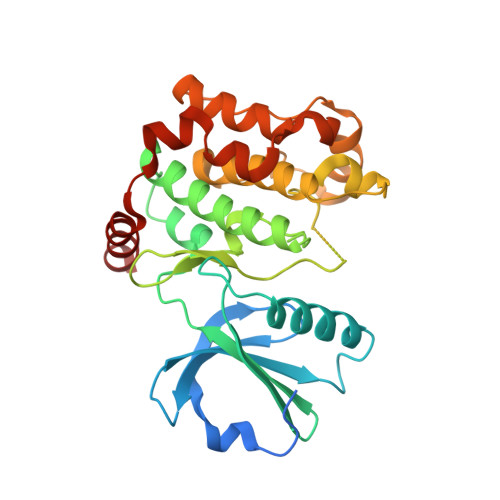Development of Selective Pyrido[2,3- d ]pyrimidin-7(8 H )-one-Based Mammalian STE20-Like (MST3/4) Kinase Inhibitors.
Rak, M., Menge, A., Tesch, R., Berger, L.M., Balourdas, D.I., Shevchenko, E., Kramer, A., Elson, L., Berger, B.T., Abdi, I., Wahl, L.M., Poso, A., Kaiser, A., Hanke, T., Kronenberger, T., Joerger, A.C., Muller, S., Knapp, S.(2024) J Med Chem 67: 3813-3842
- PubMed: 38422480
- DOI: https://doi.org/10.1021/acs.jmedchem.3c02217
- Primary Citation of Related Structures:
8BZJ, 8QLR, 8QLS, 8QLT - PubMed Abstract:
Mammalian STE20-like (MST) kinases 1-4 play key roles in regulating the Hippo and autophagy pathways, and their dysregulation has been implicated in cancer development. In contrast to the well-studied MST1/2, the roles of MST3/4 are less clear, in part due to the lack of potent and selective inhibitors. Here, we re-evaluated literature compounds, and used structure-guided design to optimize the p21-activated kinase (PAK) inhibitor G-5555 ( 8 ) to selectively target MST3/4. These efforts resulted in the development of MR24 ( 24 ) and MR30 ( 27 ) with good kinome-wide selectivity and high cellular potency. The distinct cellular functions of closely related MST kinases can now be elucidated with subfamily-selective chemical tool compounds using a combination of the MST1/2 inhibitor PF-06447475 ( 2 ) and the two MST3/4 inhibitors developed. We found that MST3/4-selective inhibition caused a cell-cycle arrest in the G1 phase, whereas MST1/2 inhibition resulted in accumulation of cells in the G2/M phase.
Organizational Affiliation:
Institute of Pharmaceutical Chemistry, Goethe University Frankfurt, Max-von-Laue-Str. 9, 60438 Frankfurt am Main, Germany.
















